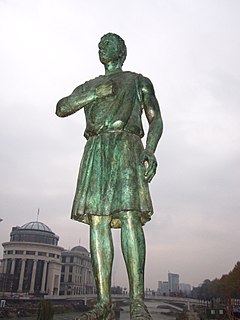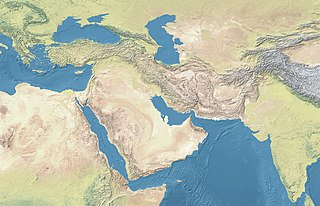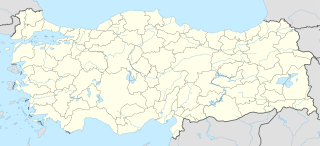This article concerns the period 339 BC – 330 BC.
Year 330 BC was a year of the pre-Julian Roman calendar. At the time, it was known as the Year of the Consulship of Crassus and Venno. The denomination 330 BC for this year has been used since the early medieval period, when the Anno Domini calendar era became the prevalent method in Europe for naming years.

The Battle of Issus occurred in southern Anatolia, on November 5, 333 BC between the Hellenic League led by Alexander the Great and the Achaemenid Empire, led by Darius III, in the second great battle of Alexander's conquest of Asia. The invading Macedonian troops defeated Persia. After the Hellenic League soundly defeated the Persian satraps of Asia Minor at the Battle of the Granicus, Darius took personal command of his army. He gathered reinforcements and led his men in a surprise march behind the Hellenic advance to cut their line of supply. This forced Alexander to countermarch, setting the stage for the battle near the mouth of the Pinarus River and the town of Issus.

The Battle of Gaugamela, also called the Battle of Arbela, was the decisive battle of Alexander the Great's invasion of the Persian Achaemenid Empire. In 331 BC Alexander's army of the Hellenic League met the Persian army of Darius III near Gaugamela, close to the modern city of Dohuk in Iraqi Kurdistan. Though heavily outnumbered, Alexander emerged victorious due to his army's superior tactics and his deft employment of light infantry. It was a decisive victory for the Hellenic League and led to the fall of the Achaemenid Empire.

The Battle of the Granicus River in May 334 BC was the first of three major battles fought between Alexander the Great and the Persian Empire. Fought in northwestern Asia Minor, near the site of Troy, it was here that Alexander defeated the forces of the Persian satraps of Asia Minor, including a large force of Greek mercenaries led by Memnon of Rhodes.

Alexander, released in North America as Reign: The Conqueror, in Europe as Alexander the Great and in South America as Alexander Senki, is a Korean-Japanese anime first released in 1999. A re-imagination of the life of Alexander the Great based on the novel of the same name by Hiroshi Aramata, the series was produced by an international crew that drew from the resources of the worldwide animation community. Character and setting design for the show was conceived by Peter Chung. Most of the production work was handled by Korean animators.

Parmenion was an ancient Macedonian general in the service of Philip II of Macedon and Alexander the Great. A nobleman, Parmenion rose to become Philip's chief military lieutenant and Alexander's Strategos. He was assassinated after his son Philotas was convicted on a charge of treason.
Attalus was an important courtier of Philip II of Macedonia.
Philotas was the eldest son of Parmenion, one of Alexander the Great's most experienced and talented generals. He rose to command the Companion Cavalry, but was accused of conspiring against Alexander and executed.
Coenus, a son of Polemocrates and son-in-law of Parmenion, was one of the ablest and most faithful of Alexander the Great's generals during his eastern expedition.
Philotas was the son of Parmenion executed by Alexander the Great.
Nicanor of Stageira in Macedonia, was despatched by Alexander the Great to proclaim at the Olympic games of 324 BCE the decree for the recall of the exiles throughout the Greek cities.

Lion of Macedon is a historic fantasy novel by English author David Gemmell. First published in 1990, it and its 1991 sequel, Dark Prince, follow the career of a fictionalized version of the Macedonian general Parmenion.
John Kavanagh is an Irish actor who has acted on the stage, in over twenty films including Cal (1984), Braveheart (1995) and Alexander (2004), and in numerous television programs. His awards include being nominated for the Drama Desk Award for Outstanding Actor in a Play in 1989 for his role in a revival of Juno and the Paycock.

The Siege of Miletus was Alexander the Great's first siege and naval encounter with the Achaemenid Empire. This siege was directed against Miletus, a city in southern Ionia, which is now located in the Aydın province of modern-day Turkey. It was captured by Parmenion's son, Nicanor in 334 BC.
For other persons with the same name, see Polydamas

Arsames was an Achaemenid Persian satrap of Cilicia in 334/3 BC. He succeeded Mazaeus in this position. He took part in the Battle of Granicus where he fought with his cavalry on the left wing, along with Arsites and Memnon of Rhodes. He was able to survive that battle and flee to the capital of Cilicia Tarsus. There he was planning a scorched-earth policy according to that of Memnon which caused the native Cilician soldiers to abandon their posts. He also decided to burn Tarsus to the ground so as not to fall in the hands of Alexander but was prevented from doing so by the speedy arrival of Parmenion with the light armored units who took the city. After that, Arsames fled to Darius who was at this time in Syria. He was slain at the battle of Issus in 333 BC.

Gryneium or Gryneion, also Grynium or Grynion (Γρύνιον) and Grynia or Gryneia (Γρύνεια), was a city of ancient Aeolis. It was located 40 stadia from Myrina and 70 from Elaea. In early times it was independent, one of the 12 important cities of Aeolis, but afterwards became subject to Myrina. It contained a sanctuary of Apollo with an ancient oracle and a splendid temple of white marble.
Grabus was the king of the Grabaei, a minor tribe in Illyria, located somewhere in what is today the northern half of Albania.
This page is based on this
Wikipedia article Text is available under the
CC BY-SA 4.0 license; additional terms may apply.
Images, videos and audio are available under their respective licenses.








